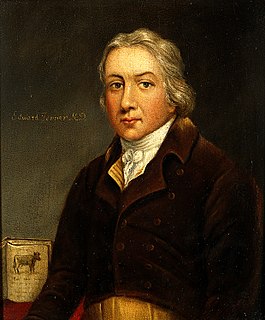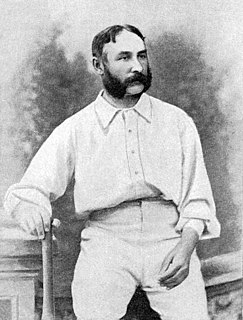
Edward Jenner, FRS FRCPE was an English physician and scientist who pioneered the concept of vaccines including creating the smallpox vaccine, the world's first vaccine. The terms vaccine and vaccination are derived from Variolae vaccinae, the term devised by Jenner to denote cowpox. He used it in 1798 in the long title of his Inquiry into the Variolae vaccinae known as the Cow Pox, in which he described the protective effect of cowpox against smallpox.

William Gilbert "W. G." Grace was an English amateur cricketer who was important in the development of the sport and is widely considered one of its greatest players. Generally known as "W. G.", he played first-class cricket for a record-equalling 44 seasons, from 1865 to 1908, during which he captained England, Gloucestershire, the Gentlemen, Marylebone Cricket Club (MCC), the United South of England Eleven (USEE) and several other teams.

Gloucestershire (, ; abbreviated Glos. is a county in South West England. The county comprises part of the Cotswold Hills, part of the flat fertile valley of the River Severn, and the entire Forest of Dean.

The Gloucestershire Wildlife Trust is the Gloucestershire local partner in a conservation network of 46 Wildlife Trusts. The Wildlife Trusts are local charities with the specific aim of protecting the United Kingdom's natural heritage. The Gloucestershire Wildlife Trust is managed by a Board of Trustees elected from its membership who provide overall direction for the development of the Trust and there are Advisory Committees. The work of the trust is carried out through staff and volunteers.

Edward George Dennett was a left arm spinner for Gloucestershire between 1903 and 1926, and from his figures could be considered one of the best bowlers never to play Test cricket. Owing to the strength of the competition at the time, Dennett was never able to progress even to lower representative levels. He failed even to be nominated as a Wisden Cricketer of the Year, though he would have been a strong candidate to be chosen in 1913. The Wisden Cricketer's Almanack picked John Wisden that year, 29 years after his death, to commemorate the 50th year of its publication.

In cricket, a century is a score of 100 or more runs in a single innings by a batter. The term is also included in "century partnership" which occurs when two batters add 100 runs to the team total when they are batting together. A century is regarded as a landmark score for batters and a player's number of centuries is generally recorded in their career statistics. Scoring a century is loosely equivalent in merit to a bowler taking five wickets in an innings, and is commonly referred to as a ton or hundred. Scores of more than 200 runs are still statistically counted as a century, although these scores are referred as double, triple, and quadruple centuries, and so on.
Gloucestershire County Cricket Club in 2005 are playing their cricket in Division One of both the County Championship and totesport League. They started the Championship at 18–1 to win it, and as one of the teams most likely to be relegated from it. So they were—only their five draws prevented them from finishing bottom, and they were the only team to lose to bottom-placed Glamorgan. By the end of August, they were relegated, with three games to spare. In the National League, they were never better than sixth at any time during the season, and lost three games in succession to be ninth before the final round of matches. They won their last match, but were still relegated due to a worse net run rate than Lancashire. They were thus the first club to suffer double relegation since Leicestershire in 2003. Their Twenty20 and C&G Trophy campaigns ended almost as early as they could have done—Gloucestershire did get past the first round of the C&G Trophy, beating Berkshire, but were knocked out by Surrey.

Ian Joseph Harvey is a former Australian cricketer. He was an all-rounder who played 73 One Day Internationals for Australia and was named as one of the five Wisden Cricketers of the Year for 2004 for his performances in county cricket.

Edward Mills Grace was an English first-class cricketer in the second half of the 19th century who was an all-rounder, batting right-handed and bowling slow right arm underarm. He played for Gloucestershire County Cricket Club and was the elder brother of W. G. and Fred Grace. All three played for England against Australia in September 1880 two weeks before Fred Grace died. Always known by his initials, E. M. Grace controversially held amateur status but was criticised for the money he made by playing.
Edward Brownlow Haygarth was an English sportsman who represented the England national football team and played first-class cricket with Gloucestershire and Hampshire.
Edward Keith Scott was an English sportsman who played first-class cricket and represented the England national rugby union team.
In cricket, a hat-trick occurs when a bowler takes three wickets with consecutive deliveries. The deliveries may be interrupted by an over bowled by another bowler from the other end of the pitch or the other team's innings, but must be three consecutive deliveries by the individual bowler in the same match. Only wickets attributed to the bowler count towards a hat-trick; run outs do not count.

Benny Alexander Cameron Howell is an English first-class cricketer. Howell is a right-handed batsman who bowls right-arm medium-fast. He was born in Bordeaux, France, and was educated at The Oratory School in Berkshire.
W. G. Grace is believed to have considered retirement from cricket before the 1878 season after he was seriously injured in a shooting accident the previous autumn which nearly cost him the sight of an eye. Having recovered, he reconsidered and in 1878 played in 33 matches, 24 of which are generally recognised as first-class. His main roles in the season were captain of Gloucestershire County Cricket Club and both match organiser and captain of the United South of England Eleven (USEE). In addition, he represented Marylebone Cricket Club (MCC), the Gentlemen in the Gentlemen v Players fixture and the South in the North v South series. 1878 was a cold, wet summer and not one of Grace's better seasons as a batsman, but he was very effective in such conditions as a right arm medium pace roundarm bowler and completed a sixth successive "double" by scoring 1,151 runs and taking 152 wickets in the recognised first-class matches.
George Ernest Edward Lambert played in 334 first-class cricket matches for Gloucestershire between 1938 and 1957. He later became cricket coach at Somerset and played three times for the first team in an injury crisis in 1960. He was born at Paddington, London and died in Bristol.
Edward Thomas Milburn is a former English cricketer. Milburn was a right-handed batsman who bowled right-arm medium pace. He was born in Nuneaton, Warwickshire.
Edward George Christopher Young is an English cricketer, a right-handed batsman and slow left-arm orthodox bowler who last played for Gloucestershire. He made his first-class debut for Oxford UCCE against Worcestershire in April 2009. Young signed a two-year development contract with Gloucestershire in August 2010 whilst also studying at Oxford Brookes University. Young's older brother, Peter was also a cricketer and also played nine first-class games for Oxford UCCE.

Adam de Harvington or de Herwynton (c.1270-c.1345) was a fourteenth-century Crown official and judge who had a successful career in both England and Ireland. He held office as Chief Baron of the Irish Exchequer and as English Chancellor of the Exchequer, and acquired considerable wealth as a result.
Edward Lovell Williams was an English cricketer. Williams was a left-handed batsman who bowled right-arm fast-medium. He was born at Shaftesbury, Dorset.









